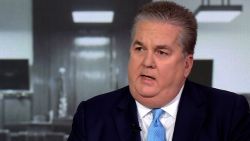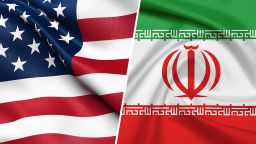Editor’s Note: John Gans, who served as chief speechwriter at the Pentagon until 2017, is director of communications and research at the University of Pennsylvania’s Perry World House. His new book, “White House Warriors,” chronicles national security advisers and policy-making from Harry Truman to Donald Trump. The views expressed in this commentary are his own. View more opinion articles on CNN.
Although Americans might suspect the national security adviser’s office in the White House is a high-tech command post, like something out of Hollywood, the modest space has few bells and whistles. It is not bereft of personal touches, however. Above his desk, President Donald Trump’s national security adviser, John Bolton, has a gold-framed portrait of President George H.W. Bush and his foreign policy team, which included then-national security adviser Brent Scowcroft.

In some ways, such a decorating choice is not a surprise: The low-profile Scowcroft, who served as national security adviser to two Presidents, is the gold standard for the position. But as the past weeks’ crisis with Iran has shown, the far more outspoken Bolton is a tough fit for the Scowcroft mold. As the current national security adviser pursues his own agenda in Iran and elsewhere, regardless of the costs in Washington and contradictions with Trump’s personal views, it is all of us who should be worried.
In many ways, Scowcroft’s shoes are impossible to fill. He graduated from the US Military Academy, got a doctorate from Columbia University, and rose through the Air Force to the rank of lieutenant general. After becoming President Richard Nixon’s military aide, Scowcroft caught on at the White House and served as then-national security adviser Henry Kissinger’s deputy and then his successor under Gerald Ford.
When Bush was elected president in 1988, one of his first appointments was Scowcroft. In addition to their long friendship and Scowcroft’s unrivaled experience, the President-elect explained at the announcement news conference that he would be an “honest broker.” Although the concept of a neutral arbiter came from academic researchers, Scowcroft tried to put it in to practice and build a system of meetings and committees to help ensure the president heard everyone’s views. That included his own: Scowcroft believed any honest broker would also make a recommendation.
Even with this rule-of-thumb approach, Scowcroft knew true honest brokering was an impossible ideal to meet in a town where trust is fragile, passion about policy drives careers, and “honesty” is often in the eye of, and defined by, one’s rivals. Still, Scowcroft’s essential wisdom was that people – be they cabinet secretaries or low-level staffers – only give their best advice when they trust there is a chance it will be heard. If not, and as he explained, then “the system doesn’t work, because they will go around you to get to the president and then you fracture the system.” Whether realized or not, even trying to be an honest broker helps ensure better advice and helps avoid potentially dangerous breakdowns amid the high stakes of national security.
Since Scowcroft’s tenure ended in 1993, national security adviser after national security advisor has promised to follow his approach to the job. None of them had the breadth of Scowcroft’ experience, the depth of his relationship with the president, or the level of respect of his colleagues on the National Security Council. Still, each successor has tried to replicate Scowcroft’s commitment to honest brokering and his system of meetings and deliberations.
Trump, of course, was a newcomer to Washington and national security when he took the oath of office in 2018, but still, the system he initiated looked a lot like Scowcroft’s. And, Bolton told The Atlantic he models himself after Scowcroft. When pressed on issues on which he has previously expressed different views than Trump, Bolton has said, “I am the national security adviser – not the national security decider.”
But although Bolton says the right things and hangs the right portrait, few would confuse him with Scowcroft. As recent crises in Venezuela and with Iran have made clear, Bolton is far more committed to seeing his own ideas carry the day and has limited the meetings and debates accordingly, as people familiar with the matter told CNN Bolton has convened fewer cabinet-level meetings of late. The result, as news reports make clear, are concerns about Bolton’s secrecy, complaints about the process he runs, and frustrations simmering with first lady Melania Trump and Secretary of State Mike Pompeo.
Now, it appears Bolton may be losing the President himself. While in Japan, Trump took to Twitter again to contradict the national security adviser on North Korea. At a time when officials in Iran and North Korea have accused Bolton of pushing a more forceful line, Trump has also taken pains to distance himself from the more bellicose views of his national security adviser.
In short, Bolton is living Scowcroft’s nightmare: Trust is broken in Washington, and the exchange of ideas it supports has broken down amid infighting. But it is all of us who should be scared. At a time when the US faces challenges in nearly every quarter of the world, Washington policymakers need as many good ideas as they can get their hands on.






















